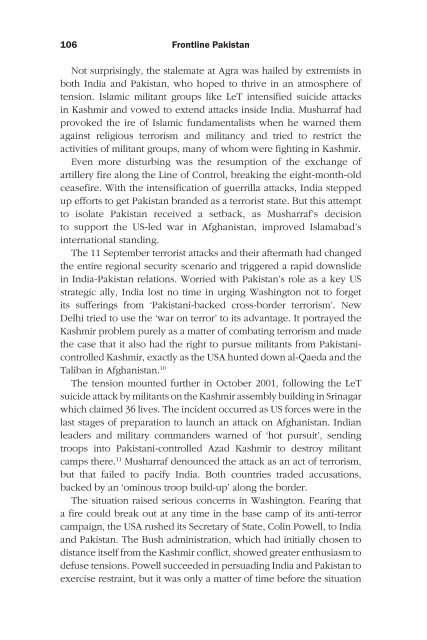Frontline Pakistan : The Struggle With Militant Islam - Arz-e-Pak
Frontline Pakistan : The Struggle With Militant Islam - Arz-e-Pak
Frontline Pakistan : The Struggle With Militant Islam - Arz-e-Pak
Create successful ePaper yourself
Turn your PDF publications into a flip-book with our unique Google optimized e-Paper software.
10 <strong>Frontline</strong> <strong><strong>Pak</strong>istan</strong><br />
Not surprisingly, the stalemate at Agra was hailed by extremists in<br />
both India and <strong><strong>Pak</strong>istan</strong>, who hoped to thrive in an atmosphere of<br />
tension. <strong>Islam</strong>ic militant groups like LeT intensified suicide attacks<br />
in Kashmir and vowed to extend attacks inside India. Musharraf had<br />
provoked the ire of <strong>Islam</strong>ic fundamentalists when he warned them<br />
against religious terrorism and militancy and tried to restrict the<br />
activities of militant groups, many of whom were fighting in Kashmir.<br />
Even more disturbing was the resumption of the exchange of<br />
artillery fire along the Line of Control, breaking the eight-month-old<br />
ceasefire. <strong>With</strong> the intensification of guerrilla attacks, India stepped<br />
up efforts to get <strong><strong>Pak</strong>istan</strong> branded as a terrorist state. But this attempt<br />
to isolate <strong><strong>Pak</strong>istan</strong> received a setback, as Musharraf’s decision<br />
to support the US-led war in Afghanistan, improved <strong>Islam</strong>abad’s<br />
international standing.<br />
<strong>The</strong> 11 September terrorist attacks and their aftermath had changed<br />
the entire regional security scenario and triggered a rapid downslide<br />
in India-<strong><strong>Pak</strong>istan</strong> relations. Worried with <strong><strong>Pak</strong>istan</strong>’s role as a key US<br />
strategic ally, India lost no time in urging Washington not to forget<br />
its sufferings from ‘<strong><strong>Pak</strong>istan</strong>i-backed cross-border terrorism’. New<br />
Delhi tried to use the ‘war on terror’ to its advantage. It portrayed the<br />
Kashmir problem purely as a matter of combating terrorism and made<br />
the case that it also had the right to pursue militants from <strong><strong>Pak</strong>istan</strong>icontrolled<br />
Kashmir, exactly as the USA hunted down al-Qaeda and the<br />
Taliban in Afghanistan. 10<br />
<strong>The</strong> tension mounted further in October 2001, following the LeT<br />
suicide attack by militants on the Kashmir assembly building in Srinagar<br />
which claimed 36 lives. <strong>The</strong> incident occurred as US forces were in the<br />
last stages of preparation to launch an attack on Afghanistan. Indian<br />
leaders and military commanders warned of ‘hot pursuit’, sending<br />
troops into <strong><strong>Pak</strong>istan</strong>i-controlled Azad Kashmir to destroy militant<br />
camps there. 11 Musharraf denounced the attack as an act of terrorism,<br />
but that failed to pacify India. Both countries traded accusations,<br />
backed by an ‘ominous troop build-up’ along the border.<br />
<strong>The</strong> situation raised serious concerns in Washington. Fearing that<br />
a fire could break out at any time in the base camp of its anti-terror<br />
campaign, the USA rushed its Secretary of State, Colin Powell, to India<br />
and <strong><strong>Pak</strong>istan</strong>. <strong>The</strong> Bush administration, which had initially chosen to<br />
distance itself from the Kashmir conflict, showed greater enthusiasm to<br />
defuse tensions. Powell succeeded in persuading India and <strong><strong>Pak</strong>istan</strong> to<br />
exercise restraint, but it was only a matter of time before the situation













